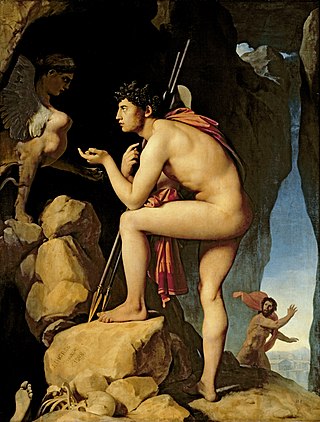
Sigmund Freud was an Austrian neurologist and the founder of psychoanalysis, a clinical method for evaluating and treating pathologies seen as originating from conflicts in the psyche, through dialogue between patient and psychoanalyst, and the distinctive theory of mind and human agency derived from it.
In psychoanalytic theory, the id, ego and superego are three distinct, interacting agents in the psychic apparatus, defined in Sigmund Freud's structural model of the psyche. The three agents are theoretical constructs that Freud employed to describe the basic structure of mental life as it was encountered in psychoanalytic practice. Freud himself used the German terms das Es, Ich, and Über-Ich, which literally translate as "the it", "I", and "over-I". The Latin terms id, ego and superego were chosen by his original translators and have remained in use.
Castration anxiety is an overwhelming fear of damage to, or loss of, the penis—a derivative of Sigmund Freud's theory of the castration complex, one of his earliest psychoanalytic theories. The term refers to the fear of emasculation in both a literal and metaphorical sense.
Mother's boy, also commonly and informally mummy's boy or mama's boy, is a derogatory term for a man seen as having an unhealthy dependence on his mother at an age at which he is expected to be self-reliant. Use of this phrase is first attested in 1901. The term mama's boy has a connotation of effeminacy and weakness. The counter term, for women, would be a father complex.
The genital stage in psychoanalysis is the term used by Sigmund Freud to describe the final stage of human psychosexual development. The individual develops a strong sexual interest in people outside of the family.
The castration complex is a concept developed by Sigmund Freud, first presented in 1908, initially as part of his theorisation of the transition in early childhood development from the polymorphous perversity of infantile sexuality to the ‘infantile genital organisation’ which forms the basis for adult sexuality. The trauma induced by the child’s discovery of anatomical difference between the sexes gives rise to the fantasy of female emasculation or castration.
In psychoanalysis, psychosexual development is a central element of the sexual drive theory. According to Freud, personality develops through a series of childhood stages in which pleasure seeking energies from the child become focused on certain erogenous areas. An erogenous zone is characterized as an area of the body that is particularly sensitive to stimulation. The five psychosexual stages are the oral, the anal, the phallic, the latent, and the genital. The erogenous zone associated with each stage serves as a source of pleasure. Being unsatisfied at any particular stage can result in fixation. On the other hand, being satisfied can result in a healthy personality. Sigmund Freud proposed that if the child experienced frustration at any of the psychosexual developmental stages, they would experience anxiety that would persist into adulthood as a neurosis, a functional mental disorder.
The anal stage is the second stage in Sigmund Freud's theory of psychosexual development, taking place approximately between the ages 18 months and three years. According to Freud, the anus is the primary erogenous zone and pleasure is derived from controlling bladder and bowel movement. The major conflict issue during this stage is toilet training. A fixation at this stage can result in a personality that is too rigid or one that is too disordered.

Three Essays on the Theory of Sexuality, sometimes titled Three Contributions to the Theory of Sex, is a 1905 work by Sigmund Freud, the founder of psychoanalysis, in which the author advances his theory of sexuality, in particular its relation to childhood.

Herbert Graf was an Austrian-American opera producer. Born in Vienna in 1903, he was the son of Max Graf (1873–1958), and Olga Hönig. His father was an Austrian author, critic, musicologist and member of Sigmund Freud's circle of friends. Herbert Graf was the Little Hans discussed in Freud's 1909 study Analysis of a Phobia in a Five-year-old Boy.
Polymorphous perversity is Sigmund Freud's descriptive term for the non-specific nature of childhood sexuality in its primordial form. In psychoanalytic theory, infantile sexual energy (libido) is yet to be definitively channelled into specific aims and objects, and is capable of focusing itself in any direction and on any object. The term points to the amorphous and changeable nature of the libido prior to being shaped in the processes of socialization and psycho-sexual development. Sexual pleasure in this sense is not merely genital, but potentially present in all sensual interactions, including touching, smelling, sucking, viewing, exhibiting, rocking, defecating, urinating, hurting, and being hurt. It is this original non-specificity of the libido in early childhood that makes possible the variations of the sexual drive that later manifest as so-called 'perversions’ in the adult.

Feminists have long struggled with Sigmund Freud's classical model of gender and identity development, which centers on the Oedipus complex. Freud's model, which became integral to orthodox psychoanalysis, suggests that because women lack the visible genitals of the male, they feel they are "missing" the most central characteristic necessary for gaining narcissistic value—therefore developing feelings of gender inequality and penis envy. In his late theory on the feminine, Freud recognized the early and long lasting libidinal attachment of the daughter to the mother during the pre-oedipal stages. Feminist psychoanalysts have confronted these ideas and reached different conclusions. Some generally agree with Freud's major outlines, modifying it through observations of the pre-Oedipal phase. Others reformulate Freud's theories more completely.
The latency stage is the fourth stage of Sigmund Freud's model of a child's psychosexual development. Freud believed that the child discharges their libido through a distinct body area that characterizes each stage.
The Blacky pictures test was a projective test, employing a series of twelve picture cards, used by psychoanalysts in mid-20th century America and elsewhere, to investigate the extent to which children's personalities were shaped by Freudian psychosexual development.

In neo-Freudian psychology, the Electra complex, as proposed by Swiss psychiatrist and psychoanalyst Carl Jung in his Theory of Psychoanalysis, is a girl's psychosexual competition with her mother for possession of her father. In the course of her psychosexual development, the complex is the girl's phallic stage; a boy's analogous experience is the Oedipus complex. The Electra complex occurs in the third—phallic stage —of five psychosexual development stages: the oral, the anal, the phallic, the latent, and the genital—in which the source of libido pleasure is in a different erogenous zone of the infant's body.

In classical psychoanalytic theory, the Oedipus complex refers to a son's sexual attitude towards his mother and concomitant hostility toward his father, first formed during the phallic stage of psychosexual development. A daughter's attitude of desire for her father and hostility toward her mother is referred to as the feminine Oedipus complex. The general concept was considered by Sigmund Freud in The Interpretation of Dreams (1899), although the term itself was introduced in his paper A Special Type of Choice of Object made by Men (1910).
Penis envy is a stage in Sigmund Freud's theory of female psychosexual development, in which young girls experience anxiety upon realization that they do not have a penis. Freud considered this realization a defining moment in a series of transitions toward a mature female sexuality. In Freudian theory, the penis envy stage begins the transition from attachment to the mother to competition with the mother for the attention and affection of the father. The young boy's realization that women do not have a penis is thought to result in castration anxiety.
Phallic monism is a term introduced by Chasseguet-Smirgel to refer to the theory that in both sexes the male organ—i.e. the question of possessing the penis or not—was the key to psychosexual development.

Sigmund Freud is considered to be the founder of the psychodynamic approach to psychology, which looks to unconscious drives to explain human behavior. Freud believed that the mind is responsible for both conscious and unconscious decisions that it makes on the basis of psychological drives. The id, ego, and super-ego are three aspects of the mind Freud believed to comprise a person's personality. Freud believed people are "simply actors in the drama of [their] own minds, pushed by desire, pulled by coincidence. Underneath the surface, our personalities represent the power struggle going on deep within us".
In psychoanalysis, phallic woman is a concept to describe a woman with the symbolic attributes of the phallus. More generally, it describes any woman possessing traditionally masculine characteristics.









